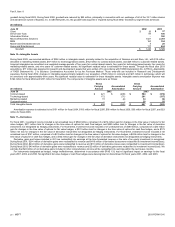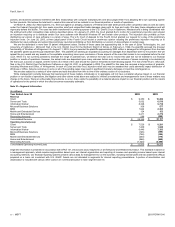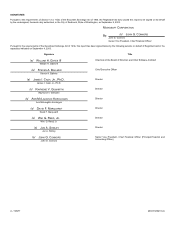Microsoft 2003 Annual Report Download - page 49
Download and view the complete annual report
Please find page 49 of the 2003 Microsoft annual report below. You can navigate through the pages in the report by either clicking on the pages listed below, or by using the keyword search tool below to find specific information within the annual report.Part II, Item 8
MSFT 2003 FORM 10-K
36 /
other things, our breakup into two companies. The Judgment was stayed pending an appeal. On June 28, 2001, the U.S. Court of Appeals for the District of
Columbia Circuit affirmed in part, reversed in part, and vacated the Judgment in its entirety and remanded the case to the District Court for a new trial on one
Section 1 claim and for entry of a new judgment consistent with its ruling. In its ruling, the Court of Appeals substantially narrowed the bases of liability found by
the District Court, but affirmed some of the District Court’s conclusions that we had violated Section 2. We entered into a settlement with the United States on
November 2, 2001. Nine states (New York, Ohio, Illinois, Kentucky, Louisiana, Maryland, Michigan, North Carolina and Wisconsin) agreed to settle on substantially
the same terms on November 6, 2001. On November 1, 2002, the Court approved the settlement as being in the public interest, conditioned upon the parties’
agreement to a modification to one provision related to the Court’s ongoing jurisdiction. Nine states and the District of Columbia continued to litigate the remedies
phase of New York v. Microsoft. The non-settling states sought remedies that would have imposed much broader restrictions on our business than the settlement
with the DOJ and nine other states. On November 1, 2002, the Court entered a Final Judgment in this part of the litigation that largely mirrored the settlement
between us, the DOJ and the settling states, with some modifications and a different regime for enforcing compliance. The Court declined to impose other and
broader remedies sought by the non-settling states. Two states, Massachusetts and West Virginia, appealed from this decision of the trial court, and West Virginia
dismissed its appeal as part of a settlement with us of several other cases.
The European Commission has instituted proceedings in which it alleges that we have failed to disclose information that our competitors claim they need to
interoperate fully with Windows 2000 clients and servers and that we have engaged in discriminatory licensing of such technology, as well as improper bundling of
multimedia playback technology in the Windows operating system. The remedies sought, though not fully defined, include mandatory disclosure of our Windows
operating system technology, either the removal of Windows Media technology from Windows or a “must carry” obligation requiring OEMs to install competitive
media players with Windows, and imposition of fines in an amount that could be as large as 10% of our worldwide annual revenue. We deny the European
Commission’s allegations and intend to contest the proceedings vigorously. In other ongoing investigations, various foreign governments and several state
Attorneys General have requested information from us concerning competition, privacy, and security issues.
A large number of antitrust and unfair competition class action lawsuits have been filed against us in various state and Federal courts. The Federal cases have
been consolidated in the U.S. District Court for Maryland. These cases allege that we have competed unfairly and unlawfully monopolized alleged markets for
operating systems and certain software applications, and they seek to recover on behalf of variously defined classes of direct and indirect purchasers overcharges
we allegedly charged for these products. To date, courts have dismissed all claims for damages against us by indirect purchasers under Federal law and in 16
different states. Nine of those state court decisions have been affirmed on appeal. Claims on behalf of foreign purchasers have also been dismissed. Appeals of
several of these rulings are still pending. No trials have been held concerning any liability issues. Courts in ten states have ruled that these cases may proceed as
class actions, while courts in two states have denied class certification status, and another court has ruled that no class action is available for antitrust claims in
that state. The Federal District Court has certified a class of direct purchasers of our operating system software that acquired the software from the
shop.Microsoft.com Web site or pursuant to a direct marketing campaign and otherwise denied certification of the proposed classes. Members of the certified class
licensed fewer than 550,000 copies of operating system software from Microsoft. In 2003, we reached an agreement with counsel for the California plaintiffs to
settle all claims in 27 consolidated cases in that state. Under the proposed settlement, class members will be able to obtain vouchers with a total face value of up
to $1.1 billion that may be redeemed for cash against purchases of a wide variety of platform-neutral computer hardware and software. Two-thirds of the amount
unclaimed or unredeemed by class members then will be made available to certain schools in California in the form of vouchers that also may be redeemed for
cash against purchased of a wide variety of platform-neutral computer hardware, software and related services. The court in California preliminarily approved this
proposed settlement, but it still requires final approval by the court. In 2003, we also reached similar agreements to settle all claims in Montana, Florida, West
Virginia and North Carolina. The total face value of the Montana settlement is $12.3 million, the Florida settlement, $202 million, the West Virginia settlement, $21
million, and the North Carolina settlement, $89.2 million. These proposed settlements are structured similar to the California settlement, except that, among other
differences, one-half of the amounts unclaimed by class members will be made available to certain schools in Montana, Florida, West Virginia and North Carolina.
The proposed settlements in Montana, Florida and West Virginia have been preliminarily approved by the courts in those states, but still require final approval. The
parties have filed a motion for preliminary approval of the settlement in North Carolina and the Court has scheduled a hearing for later this year. We intend to
continue vigorously defending the remaining lawsuits. We estimate the total cost to resolve all of these cases will range between $916 million and $1.1 billion with
the actual cost dependent upon many unknown factors such as the quantity and mix of products for which claims will be made, the number of eligible class
members who ultimately use the vouchers, the nature of hardware and software that is acquired using the vouchers, and the cost of administering the claims
process. In accordance with SFAS 5 and FIN 14, Reasonable Estimation of the Amount of a Loss, the Company has recorded a contingent liability of $916 million.
Netscape Communications Inc., a subsidiary of AOL-Time Warner Inc., filed suit against us on January 22, 2002 in U.S. District Court for the District of
Columbia, alleging violations of antitrust and unfair competition laws and other tort claims relating to Netscape and its Navigator browser. The case was transferred
for pretrial purposes to the District Court in Baltimore, Maryland and was being coordinated with the antitrust and unfair competition class actions described above.
On May 29, 2003, we and AOL Time Warner announced an agreement to settle the case. As part of the settlement, we paid $750 million to AOL Time Warner and
provided AOL Time Warner a royalty-free, seven-year license to use Microsoft Internet Explorer technologies with the AOL client. The parties agreed on various
other technical provisions and entered into a separate agreement to collaborate on long-term digital media initiatives designed to accelerate the adoption of digital
content. The two companies entered into a long-term, non-exclusive license agreement allowing AOL Time Warner to use our Windows Media 9 Series and future
software for creating, distributing and playing back high-quality digital media. As a result of the settlement, the case has been dismissed with prejudice.
Be Incorporated, a former software development company whose assets were acquired by Palm, Inc. in August 2001, filed suit against us on February 18,
2002 in the U.S. District Court for Northern California, alleging violations of Federal and state antitrust and unfair competition laws and other tort claims. Be alleges
that our license agreements with computer manufacturers, pricing
























